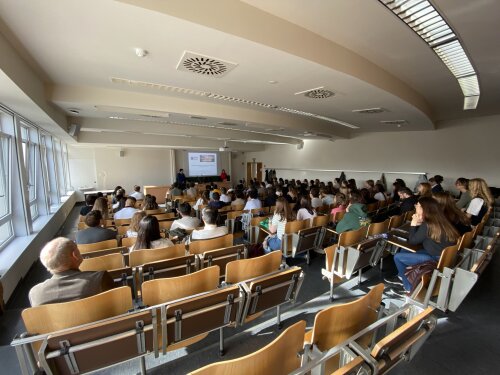Opening Ceremony 2023 - 2024
25 September 2023, 10:45 a.m. - 12:45 p.m, s.C.103
The opening ceremony of the Master of Laws programme took place on Monday 25 September 2023. During the opening, Professor Thalia Kruger addressed the new students and guests as the coordinator of the LLM programme with an introduction on looking at equal opportunities in legal education from a global perspective, specifically in the context of the language of education. Later, Professor Wouter Wandenhole Vice-Dean of the Law Faculty, opened the academic year 2023-2024.
This year’s speaker for the inaugural lecture was Prof. Klaus Beiter. He held a lecture on ‘Equality in education or a society based on equality: what comes first?’, in which he examined the neoliberal turn in education and the tensions it brings about at the nexus of decoloniality, economic inequality, and corruption. The session was followed by a discussion with the participants and a lunch.
Equality in education or a society based on equality: what comes first?
by Prof. Klaus Beiter
Equality in education means equal access to, and treatment in, education. A society based on equality is one where all can equally enjoy all human rights. Equality in education and a society based on equality are in many ways contingent on each other. To reach both goals, we need adequate framework conditions for an equal society on a much broader level, both domestically and internationally. Socio-economic rights such as education are undeniably restrained by privatisation, unbridled capitalism, and a neoliberal vision of society. Corruption is another destructive factor. Domestic governments and courts need to fully understand this. On the international level, agencies such as the OECD and the World Bank need to acknowledge that equal education and an equal society cannot be achieved if they continue to endorse that privatised, capitalist, neoliberal vision of society. This concerns questions of the global decolonisation of educational curricula, the implemention of “genuine” education for sustainable development, rights-based development co-operation with the global South, and so on. Consequently, the right to education, and socio-economic rights generally, need to operate in a different matrix if equality in education and a society based on equality are to become a reality.
Klaus Beiter is a full professor at North-West University in Potchefstroom, South Africa. His research focuses on the right to education and education law, the right to science, science law, academic/scientific freedom, intellectual property rights, the extraterritorial application of human rights, law and development, and law and language. He is an ad hoc consultant to UNESCO, a member of the Consortium for Human Rights Beyond Borders in Heidelberg, an adviser to the global Right to Education Initiative in London, and an ambassador to the Observatory Magna Charta Universitatum in Bologna.
